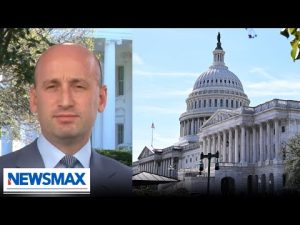In a world where every headline seems to grapple with the consequences of political decisions, it appears that the impact of a potential government shutdown is looming larger than a grizzly bear in a tiny canoe. The Republicans are pointing fingers and the Democrats are getting a solid dose of blame for this looming crisis. Now, the pressing question on everyone’s mind seems to be whether the country can weather this storm—especially with tempers flaring as United States leaders scramble to make sense of what could be a costly misstep.
A government shutdown is not just a political chess game; it sends ripples through the lives of everyday Americans. From national parks that turn into no-go zones to federal workers left twiddling their thumbs at home, this situation could create a cacophony of chaos. But instead of rolling up their sleeves and getting down to the business of addressing the issue, many politicians have taken to the airwaves, pointing out how the other party has dropped the ball. This blame game seems to be the new sport in Washington—one where everyone loses.
What’s even more perplexing is the way society grapples with understanding motives behind criminal activities. As tragedies occur, many citizens are left scratching their heads, trying to piece together the who, what, and why behind these events. Authorities such as the police and FBI have increasingly struggled to provide clear motives, sparking conversations about the state of common sense in today’s world. It’s as though the script has flipped, and what once was a straightforward narrative has transformed into a riddle wrapped in a mystery inside an enigma.
There are murmurs that this confusion stems from a broader cultural shift brought about by what some label “woke” policies. While some aim to promote diversity, equity, and inclusion, others argue that these efforts have muddied the waters of accountability. In many instances, it seems like people are more concerned with what is politically correct rather than confronting the unfiltered truth. Oddly enough, this phenomenon doesn’t appear to be one that many other nations grapple with. In places like Russia and China, authorities have no hesitation in declaring the motives behind crimes, often without the intricate webs of diplomacy and “how to be nice” that characterize the U.S. approach.
Meanwhile, everyday Americans are left feeling like they’re stuck in a continuous loop of misinformation and missed opportunities for clarity. It can be exhausting trying to cut through the noise of political rhetoric to find sensible solutions that actually address the heart of the matter. With this kind of disarray unfolding both in Washington and in the criminal justice system, common sense seems to be the first casualty in a landscape dominated by party lines and virtue signaling.
As the government teeters on the brink of shutdown and the public remains interested in answers containing substance, it’s becoming increasingly clear that a return to straightforward communication and accountability may be what’s needed most. With winter on the horizon and the need for cooperation across party lines more pressing than ever, one can only hope that leaders will find a way to collaborate effectively—before the lights go out for everyone in government and beyond.







